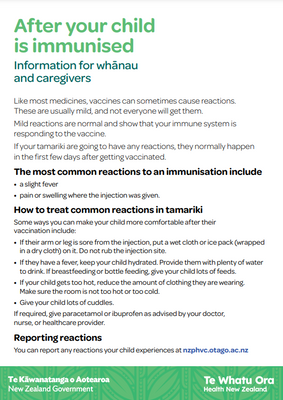After your child is immunised - NIP8866

Information for parents and caregivers about what may happen after their child is immunised, and what they can do to help.
Includes information about pertussis/whooping cough.
The full resource:
Information for whānau and caregivers
Like most medicines, vaccines can sometimes cause reactions. These are usually mild, and not everyone will get them.
Mild reactions are normal and show that your immune system is responding to the vaccine. If your tamariki are going to have any reactions, they normally happen in the first few days after getting vaccinated.
The most common reactions to an immunisation include
- a slight fever
- pain or swelling where the injection was given.
How to treat common reactions in tamariki
Some ways you can make your child more comfortable after their vaccination include:
- If their arm or leg is sore from the injection, put a wet cloth or ice pack (wrapped in a dry cloth) on it. Do not rub the injection site.
- If they have a fever, keep your child hydrated. Provide them with plenty of water to drink. If breastfeeding or bottle feeding, give your child lots of feeds.
- If your child gets too hot, reduce the amount of clothing they are wearing. Make sure the room is not too hot or too cold.
- Give your child lots of cuddles.
If required, give paracetamol or ibuprofen as advised by your doctor, nurse, or healthcare provider.
Reporting reactions
You can report any reactions your child experiences at New Zealand Pharmacovigilance Centre and Centre for Adverse Reactions Monitoring
These reactions can be expected, but they may not happen for all tamariki
| Today your child received |
Vaccine | Most common reactions |
When this could start |
| Rotavirus (Rotarix) | Mild fever, diarrhoea, vomiting | Within 7 days | |
| Measles, mumps and rubella (Priorix) | Fever, rash, unsettled, swollen glands | Rash between 5 and 12 days after immunisation | |
|
Diphtheria, tetanus, whooping cough, polio, hep B and Hib Pneumococcal Hib (Act-HIB) Diphtheria, tetanus, whooping cough and polio (INFANRIX IPV) Hep B (Engerix-B) |
Fever, unsettled, swelling or soreness at the site of injection, loss of appetite, vomiting, diarrhoea | Within 6–24 hours | |
| Chickenpox (Varilrix) | Swelling or redness at the injection site, fever, rash (rarely infectious) | Rash between 5 and 26 days after immunisation | |
| Meningococcal B (Bexsero) | Fever over 38°C, discomfort or pain around the injection site. Infants and children may also be irritable, have unusual crying or a loss of appetite. | Within 6-24 hours. Fever usually peaks 6 hours after vaccination and settles over 24–48 hours. Follow paracetamol guidance provided by your vaccinator. |
If you have a concern about a reaction after an immunisation
- talk to your doctor, nurse, or trusted healthcare provider
- call Healthline on 0800 611 116 anytime, or call your after hours medical centre
- in an emergency, call 111 for an ambulance and make sure you tell them what vaccine(s) your child was given.